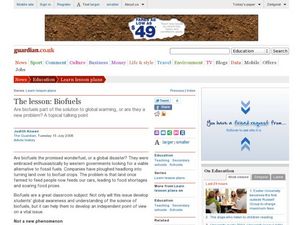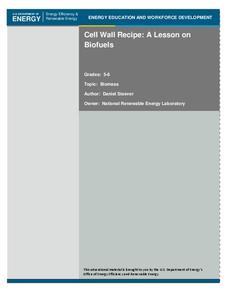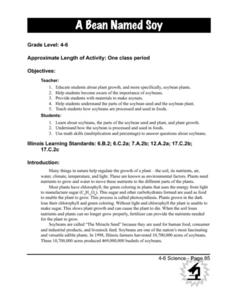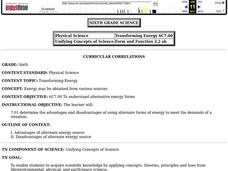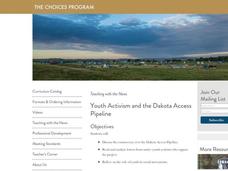Curated OER
The Lesson: Bio-fuels
Students explore the pros and cons of bio-fuel use. In this environmental stewardship lesson, students visit selected websites to discover what bio-fuels are and the effect they may have on the environment.
Curated OER
Materials, Let's Do the Life Cycle
Students examine environmental and social impacts of products that consumers buy. In this environmental stewardship lesson, students play a game that requires them to consider real costs of products. Students consider the environmental...
Curated OER
A Cleaner Today for a Greener Tomorrow
Students examine recycling efforts. In this environmental stewardship lesson, students trace recycling efforts and script a skit regarding incandescent light bulbs' effect on the environment.
Curated OER
Scientist Tracking Network
Students correlate surface radiation with mean surface temperature of several geographic regions. They observe how these parameters change with latitude and construct an understanding of the relationship of solar radiation to seasonal...
Curated OER
The Chemistry of Coal
Students investigate the chemistry of coal. This lesson serves as a review of conservation of mass, simple reactions and equation balancing. During the lesson, students research chemical components of coal, as well as environmental...
Curated OER
Solar Energy: Become a Sun Chef!
Students design and construct a solar cooker. They use the Internet to research solar collectors and the process of changing light energy into heat energy.
Curated OER
Cell Wall Recipe: A Lesson on Biofuels
Biotech engineers discover that changes in the DNA code for cell wall formation can help create crops better suited for biofuel production. They extract DNA from wheat germ. They decode paper strips with codes and relate the activity to...
Curated OER
Permit Trading
Emerging environmentalists work in groups and pretend that each is a power company generating electricity for a community. They consider the costs of building a renewable electricity generator that will increasingly replace generating...
Clean Up Australia
Why are Batteries Harmful to the Environment?
Open this lesson by reading together about primary and secondary batteries (such as nickel-cadmium cells), problems they can cause in the environment, and how humans can minimize the damage. Afterward, little ones examine a collection of...
Curated OER
Urban Ecosystems 2: Why are There Cities? A Historical Perspective
Second in a series of five lessons, this lesson encourages preteens to consider cities as urban ecosystems. First, they keep a food diary for a few days. They visit the Natrional Agricultural Statistics Service website for current data...
Curated OER
Agroforestry Challenge
Students explore agroforestry. In this Peace Corps lesson, students examine the role the trees play in deforestation efforts. Students then participate in an agroforestry game.
Curated OER
Soybeans: The Miracle Seed
Students discover why soybeans are called the "miracle seeds." They make their own soynuts and share other foods made from soybeans. They create a bulletin board of soybean products.
Rustle Leaf
Tell Someone About Earth Day
Celebrate Earth Day by spreading the word of conservation. Teach children ten easy ways to help preserve the Earth and share this knowledge with others by sending e-cards and printable cards to loved ones. Extend learning about the...
Curated OER
Transforming Energy
Sixth graders study about alternate energy sources and discuss with their neighbor how alternative energy sources affect environmental conditions so that an entire species could be affected.
Curated OER
The Energy Debate - Conclusion
Students write a persuasive essay about the choices in the energy debate. They comprehend the environmental consequences that accompany the decision. Students predict how they will power their future.
Curated OER
Environmental Issues in South Carolina
Students research governmental agencies that deal with the environment and chart aspects about each agency. They role-play a city council meeting to address the topic of building a waste to energy facility.
Curated OER
Transformation of Energy-8th Grade
Eighth graders examine how electricity is produced in relation to the atom as well as what causes electric current to flow and what determines how much current flows through a circuit. These and other concepts of transformation of energy...
Curated OER
Wetland Ecosystem Conservation
Students read articles about wetland ecosystem conservation in Florida and other countries. They summarize information found in the articles. Students reflect on the information in the articles and write their feelings.
Brown University
Youth Activism and the Dakota Access Pipeline
Do young people have a role in social movements? Should they? The involvement of young people in the Dakota Access Pipeline is the focus of a resource that asks class members to examine letters written by native youths who oppose the...
Curated OER
Ecological Impact of River Dams
Students investigate their environment by completing an in-class experiment. In this ecological lesson, students define the roles of dams and how electricity is created by them. Students utilize plastic jugs, sand and tap...
Curated OER
Greenhouse Effect: Pop Bottle Experiment
Students explore global warming by conducting a weather experiment. In this greenhouse gas lesson, students define the greenhouse effect and the impact on our ozone layer. Students utilize a soda pop bottle, floodlight bulb, thermometers...
Curated OER
Electromagnetic Spectrum
Young scholars define electromagnetic radiation, list major categories and uses of electromagnetic waves, identify potential health risks with electromagnetic waves, and demonstrate understanding of Plank's constant by solving...
Curated OER
Climate And the Greenhouse Effect
Students demonstrate the greenhouse effect. They recognize that relatively small changes to our environment can stimulate significant climate changes. They determine that the "scientific method" is a process of testing hypotheses and...
Curated OER
The Urban Heat Island Effect - Lesson 2 (Grade 5)
Fifth graders use the scientific process to examine how when various surfaces are exposed to similar environmental conditions, surface temperatures may vary. They conduct an experiment to show the relationship between surface and...


